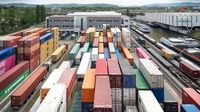The recent decision by the United States to impose a sweeping tariff regime has raised significant concerns among Swiss exporters, who are now grappling with the potential fallout from these measures. The U.S. plans to implement a basic tariff of 10 percent on goods imports from all countries, alongside additional tariffs of up to 34 percent for nations with a notable trade surplus with the U.S. For Switzerland, this could mean an overall tariff of 31 or 32 percent on various goods, creating a challenging environment for its export-driven economy.
Approximately 15 percent of all Swiss goods exports are directed towards the U.S. market, and if the current exemption for pharmaceuticals remains in place, about 6 percent of Swiss exports would be directly impacted. The federal government is keenly aware of the stakes involved and is actively seeking dialogue with U.S. officials. Bundespräsidentin Karin Keller-Sutter and Wirtschaftsminister Guy Parmelin are expected to engage in discussions at the upcoming spring meeting of the International Monetary Fund and the World Bank in Washington towards the end of April.
Switzerland’s import tariffs are considerably lower than those of the U.S., with a trade-weighted average of under 2 percent prior to the new tariff wall. In 2024, Switzerland abolished all import tariffs for products outside of agriculture, positioning itself as a competitive player in global trade. However, the U.S. government claims that Switzerland's import barriers are equivalent to tariffs of over 60 percent, a figure that Swiss officials contest as exaggerated.
The Swiss economy is characterized by its liberal market policies and low levels of bureaucracy compared to the European Union. These factors have historically contributed to Switzerland's strong export performance. However, the looming U.S. tariffs represent a significant threat to this model, as they could undermine the competitive advantages that Swiss companies have enjoyed.
In light of these developments, the Swiss People’s Party (SVP) has called for immediate action from the Federal Council, demanding the presentation of an initial relief program by May 5, 2025. The SVP argues that the Swiss government must take proactive steps to alleviate the economic strain caused by the tariffs. According to the party, the response should include comprehensive reductions in bureaucracy and regulatory costs, as well as a halt on adopting any further EU-driven laws and regulations that could exacerbate the situation.
The SVP also emphasizes the importance of maintaining Switzerland's economic independence, arguing against any moves that would tie the country more closely to the EU, particularly in light of the ongoing tariff disputes with the U.S. They believe that embracing the EU's regulatory framework could lead to further complications and hinder Switzerland's ability to navigate the current trade landscape.
As the U.S. imposes these tariffs, the Swiss government is exploring potential avenues for negotiation. There are discussions of offering concessions, such as lowering tariffs on agricultural products or providing investment guarantees similar to those made by EFTA countries to India, which promised to facilitate $100 billion in investments over 15 years. This approach could create jobs and foster goodwill in Washington, though it remains to be seen whether such offers will resonate with the U.S. administration.
Despite the challenges posed by the tariff wall, the Swiss government is not currently forecasting a recession in its base scenario. The Basler Wirtschaftsinstitut BAK and UBS economists have suggested that while the situation is concerning, it does not necessarily indicate an immediate economic downturn. However, if the U.S. extends tariffs to the pharmaceutical sector, the repercussions could be severe, potentially leading to retaliatory tariffs from other countries and escalating tensions in global trade.
In response to the pressing need for economic resilience, the Swiss government is also considering other measures to bolster its economy. These include expanding international trade agreements with nations such as Mercosur, Thailand, and Vietnam, as well as reinforcing ties with the EU, which remains Switzerland's most important trading partner.
The SVP's call for a relief program reflects a growing consensus that the Swiss economy must adapt to the changing global landscape. As export-driven industries face mounting pressures, the government must find ways to mitigate the impact of U.S. tariffs while simultaneously addressing domestic regulatory challenges. The proposed measures aim to enhance Switzerland's competitiveness and ensure that the economy can weather the storm of international trade disputes.
Ultimately, the situation remains fluid, and the Swiss government is poised to engage in further discussions with U.S. officials in hopes of finding a resolution. The outcome of these negotiations could have lasting implications for the Swiss economy and its ability to thrive in an increasingly protectionist world.






